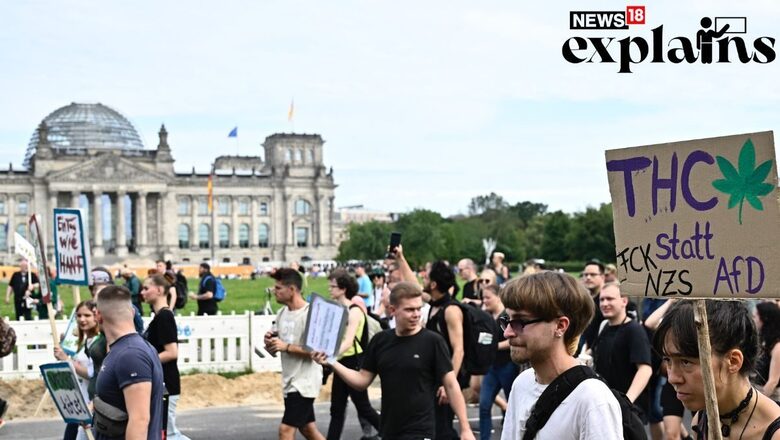
views
A German politician from the far-right Alternative for Germany (AfD) party was arrested for allegedly displaying Nazi symbols, after “Sieg Heil” was heard coming from the headquarters of a fraternity to which he belongs.
Daniel Halemba, who was recently elected to the Bavarian state parliament, is being investigated for incitement and the use of symbols of unconstitutional organizations. He is the youngest politician to be elected to the Bavarian parliament and is a member of the Teutonia Prague student fraternity.
Halemba has admitted to being a member of a fraternity, “Burschenschaft Teutonia Prag zu Würzburg,” which was raided by authorities last month, according to DW. It was raided in September on suspicion that there might be objects featuring Nazi insignia and racist documents on its premises.
Why is Displaying Nazi Symbol Banned?
Anti-Semitism is a highly sensitive issue in Germany, whose 1933-45 Nazi regime under Adolf Hitler murdered 6 million Jews in the Holocaust. Under German law, it is illegal to display symbols of unconstitutional organizations, such as the Nazi swastika.
The German penal code prohibits publicly denying the Holocaust and disseminating Nazi propaganda, both off- and online. Nazi iconography including sharing images such as swastikas, wearing an SS uniform and making statements in support of Hitler is banned.
Remarks considered to be inciting hatred are punishable with imprisonment and it is a crime to insult somebody in public. Moreover, the hate-speech laws were tightened in 2020, after terror attacks in 2019 and early 2020 prompted German authorities to warn of increasing extremism.
Key Laws Governing Hate Speech
Here is a list of some laws that govern hate speech and Holocaust denial in Germany:
- Section 130: Section 130 of the German criminal code criminalizes certain types of hate speech and bans incitement to hatred and insults based on racial, national, religious or ethnic background. In post-World War II Germany, it has been used to prosecute racist and antisemitic threats and slurs, and it carries a sentence of up to five years in prison.
- Germans can face up to three years in prison for “approving of, glorifying or justifying” Nazi rule. The provision was added in 2005 after an increase in far-right extremist demonstrations.
- Chapter 14: The law also prohibits a range of personal insults, from malicious gossip against private citizens to defamation against politicians.
- Sections 86 and 86a: The two provisions ban the distribution of online and offline propaganda and public display of “flags, insignia, uniforms, slogans and forms of greeting” belonging to banned political parties or groups like the Nazis and neo-Nazis.
- Network Enforcement Act: In 2017, the country passed a landmark law, the Network Enforcement Act, that forced internet platforms like Facebook and others to take down hate speech, terror threats and child exploitation in as little as 24 hours of being notified or face heavy fines.
Recent Rise of Anti-Semitism in Germany
German Chancellor Olaf Scholz has vowed to take a “zero tolerance” approach to antisemitism. Recently, Scholz has doubled down on the pledge after assailants hurled two molotov cocktails at a synagogue in central Berlin and the Star of David was found daubed on the facades of buildings where Jews live in Berlin, according to The Guardian.
Germany has seen a spate of anti-Semitic incidents in the wake of the October 7 attacks by Hamas on Israel and Israel’s retaliatory bombing campaign.
The country is grappling with a rise in politically motivated crimes including around 29 per cent surge in antisemitic crimes in 2021. 2,552 out of 3,027 offences were attributed to far-right extremists.
Germany has the third-largest Jewish community in Europe, according to the Interior Ministry. The Central Council of Jews in Germany puts the number of practising Jews in the country at around 100,000 and the number of synagogues at around 100, according to AFP.
A survey showed that 59 per cent of voting-age Germans believed that anti-Semitism was spreading in their communities. More than a quarter of Germans hold anti-Semitic beliefs, according to a study by the World Jewish Congress.
AfD and Its Right-Wing Politics
The AfD has seen its popularity surge in Germany amid concerns about migration and the economy. The far-right party has enjoyed record election results in recent months and has finished third in Bavaria and second in the state of Hesse.
The AfD is polling at around 22 per cent, far ahead of all three parties in Chancellor Olaf Scholz’s unpopular centre-left-led ruling coalition ahead of the federal election due in 2025.
The AfD swept into the lower house of parliament for the first time in 2018 elections, tapping into widespread frustration about Chancellor Angela Merkel’s 2015 decision to open the borders to over 1 million mostly Muslim migrants.




















Comments
0 comment